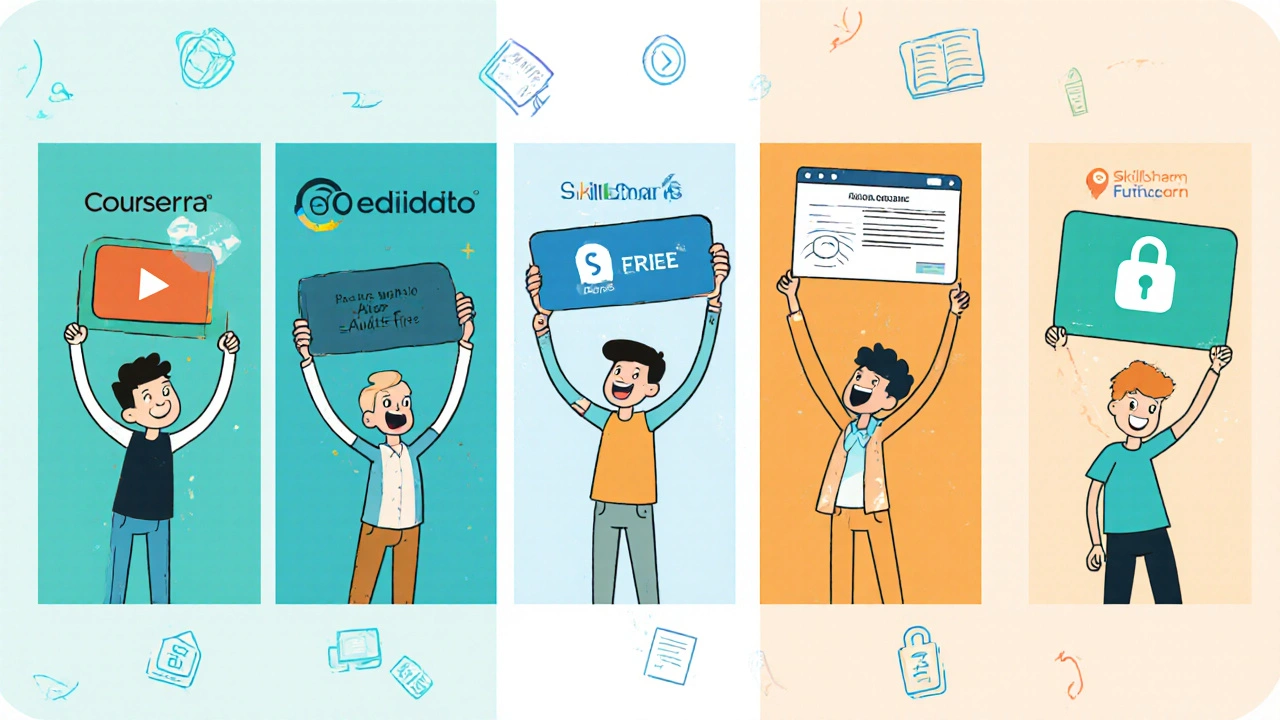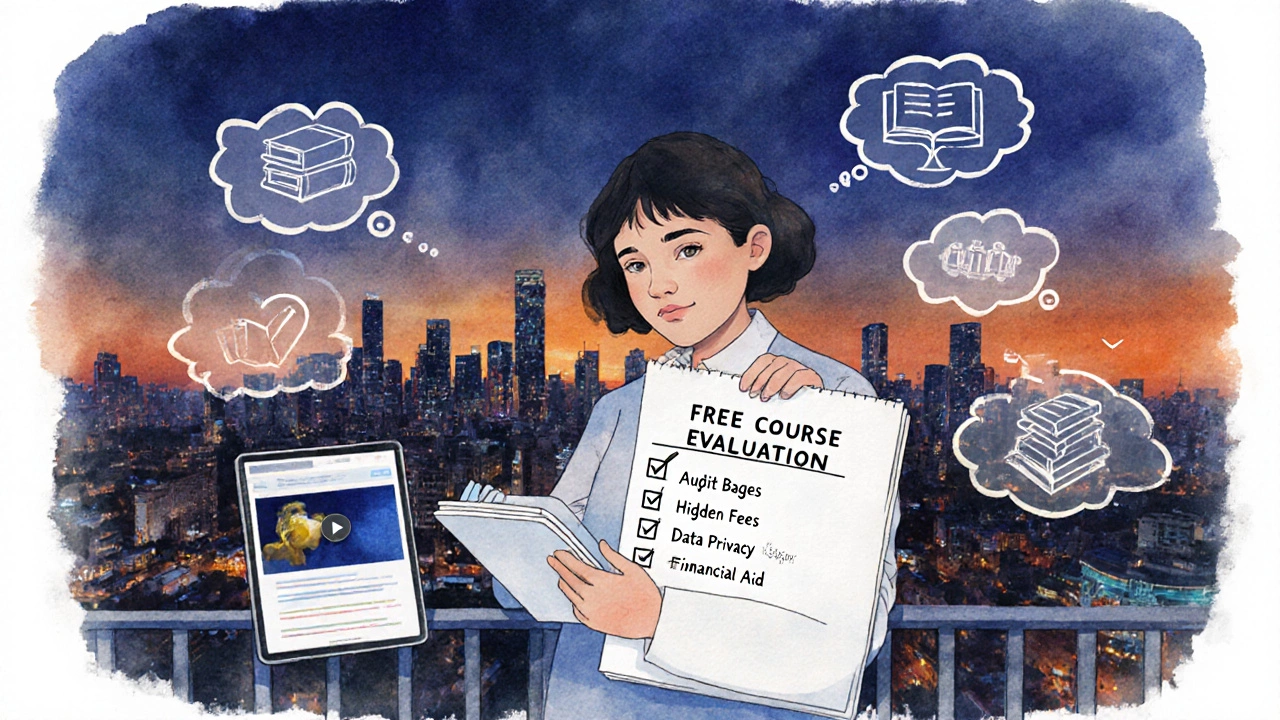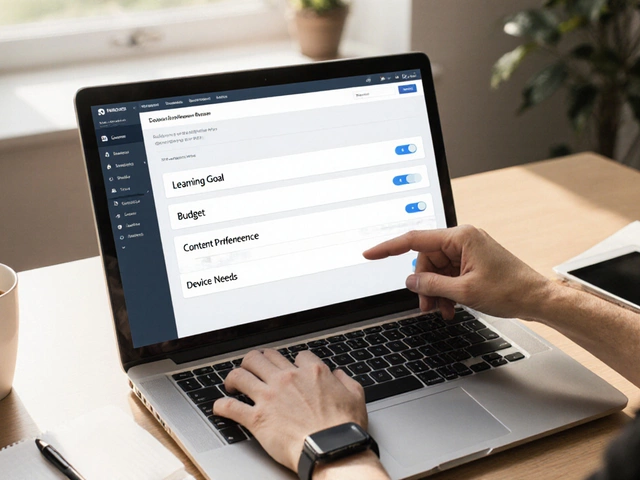
Free Course Cost Calculator
Calculate the true cost of your free online course. Many "free" courses hide fees for certificates, subscriptions, and premium features. Enter the details below to see the real cost.
Estimated Total Cost
No certificate required. No subscription needed.
Check if you qualify for certificate discounts through the platform's financial aid program.
Everyone’s bragging about how they took a free online course and learned a new skill, but have you ever wondered what "free" actually covers? Below you’ll find the reality behind those zero‑dollar price tags, the sneaky fees that pop up later, and how to make sure you truly get a cost‑free learning experience.
Key Takeaways
- Most platforms let you audit courses for free, but certificates, graded assignments, and premium tools usually cost extra.
- Hidden fees can include certification charges, subscription tiers, data‑usage fees, and even required purchases of textbooks.
- Understanding each platform’s business model helps you avoid surprise charges and pick the right free option.
- Look for open‑access licenses, audit tracks, and financial‑aid programs to stay truly cost‑free.
- Use the checklist and comparison table to evaluate any free course before you enroll.
When we talk about free online courses are digital learning programs that let learners access video lectures, readings, and discussion forums without an upfront payment, the first thing that comes to mind is a zero‑cost education. In practice, however, the term "free" is a marketing shade rather than a guarantee.
What “Free” Actually Means on MOOC Platforms
Most major MOOC (Massive Open Online Course) providers use a freemium model. You can watch the same lecture videos as paying students, but you lose access to graded quizzes, peer‑review assignments, and the official certificate that proves you completed the course.
For example, Coursera offers an "audit" mode that grants free video access while locking the grading and credential features behind a paywall. The same applies to edX which lets you enroll for free but requires a verified track purchase for certificates and certain assessments.
Common Hidden Costs You Might Not Expect
- Certificate fees: While learning material may be free, most platforms charge $30‑$150 for an official certificate.
- Premium content: Some courses hide supplementary labs, case studies, or industry‑specific tools behind a subscription.
- Textbook purchases: A handful of university‑partnered courses require you to buy an ISBN‑listed textbook at full price.
- Data & bandwidth: Streaming high‑definition video can eat up mobile data plans, especially in regions with expensive data caps.
- Financial‑aid eligibility: Platforms often promise free certificates if you qualify for aid, but the application process can be time‑consuming.

Business Models Behind the Free Label
Understanding the revenue streams of each platform helps you anticipate where costs may surface.
Udacity operates on a nanodegree subscription model, offering a limited free preview period before requiring a monthly payment for full access. In contrast, Skillshare uses a freemium approach where a handful of classes remain permanently free, while the majority sit behind a $19‑$39 monthly membership.
FutureLearn provides free access for the course duration plus 14 days, after which a paid upgrade unlocks extended access and certificates. Knowing these timelines prevents surprise renewals.
How to Spot Truly Free Courses
- Check for an "audit" or "free" badge on the enrollment page.
- Read the fine print: look for keywords like "certificate not included" or "paid upgrade required".
- Search for Open Educational Resources (OER) licenses such as Creative Commons-these are genuinely free to use and share.
- Explore university portals that host MOOCs as part of public outreach; they often provide free certificates for a limited time.
- Verify whether the platform offers financial aid or scholarship options for learners who cannot afford the certificate fee.
Calculating the Real Value of a Free Course
Even if you don’t pay money, you still invest time, attention, and sometimes personal data. Ask yourself:
- Will the knowledge directly help me land a job or a promotion?
- Do I need the certificate to prove completion to employers?
- Is the platform collecting my email or usage data for marketing purposes?
- Can I find the same material on a truly open platform like MIT OpenCourseWare which publishes entire course syllabi and lecture videos under a permissive license?

Checklist: Evaluate Before Signing Up
- Is the course labeled "audit" or "free" on the enrollment page?
- Are certification, graded assignments, or premium labs behind a paywall?
- Does the platform require a subscription after a trial period?
- Are there any textbook or software purchases mentioned?
- Is financial aid available and how long does the application take?
- What data does the platform collect, and can I opt out?
- Do I need a credential for my career goal, or is knowledge alone sufficient?
Comparison of Popular MOOC Platforms
| Platform | Free Audit Available | Certificate Cost (USD) | Subscription Model | Financial Aid | Open‑Access License |
|---|---|---|---|---|---|
| Coursera | Yes (video only) | $49‑$199 per certificate | Coursera Plus $399/yr | Available for most courses | Mixed (some partner courses are OER) |
| edX | Yes (audit) | $50‑$300 per verified certificate | edX Plus $499/yr | Limited scholarships | Many MIT/Harvard courses are OER |
| Udacity | Limited free previews | Not applicable (nanodegree only) | $399‑$999 per nanodegree (monthly) | None | Proprietary |
| Skillshare | 5‑10 free classes | Certificate not offered | $19‑$39/mo | None | Proprietary |
| FutureLearn | Yes (course duration + 14 days) | $39‑$149 per certificate | Premium $199/yr | Limited scholarships | Mixed |
Frequently Asked Questions
Can I get a free certificate on any platform?
Only a few platforms, like Alison, offer completely free certificates. Most major MOOC sites charge a fee for verification, even if the course content itself is free.
Does auditing a course give me full knowledge?
Auditing provides access to video lectures and readings, which cover most of the core material. However, you miss graded quizzes, peer feedback, and sometimes critical labs that reinforce learning.
What’s the difference between a free preview and a free course?
A preview is a short excerpt-often a single module-meant to showcase the course. A free course lets you access the entire syllabus without paying, though it may still lock certificates or assessments.
Are there any privacy concerns with free MOOCs?
Free platforms often collect email addresses, browsing data, and sometimes even resume information for marketing. Review the privacy policy; many allow you to opt out of promotional emails but not data analytics.
How can I use free courses for career advancement without paying for certificates?
Add the skills you learned to your resume and LinkedIn profile, reference specific project work you completed during the course, and be prepared to discuss them in interviews. Many employers value demonstrable ability over a piece of paper.
Bottom line: "Free" is rarely an all‑inclusive term. By checking audit options, hidden fees, and data policies, you can truly leverage cost‑free learning without unexpected costs.







